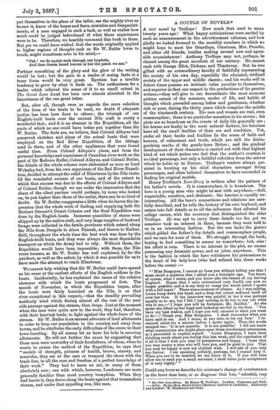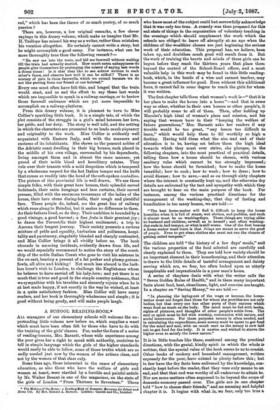A COUPLE OF NOVELS.*
A NEW novel by Trollope ! How much that used to mean twenty years ago! What happy anticipations were excited by such an announcement in the advertisement columns, and how gladly we looked forward to the monthly numbers in which we might hope to meet the Grantleys, Craniums, Mrs. Proudie, and other old friends, besides making several new and agree- able acquaintances ! Anthony Trollope may not, perhaps, be classed among the great novelists of our century. He cannot rank with George Eliot, Dickens, and Thackeray. But he was gifted with an extraordinary faculty of faithfully representing the society of his own day, especially the educated, civilised society of the upper and middle classes ; and his works will in future times possess an intrinsic value peculiar to themselves, and superior in that one respect to the productions of far greater writers,—they will give to our descendants the most accurate picture extant of the manners, modes of life, and habits of thought which prevailed among ladies and gentlemen, whether rich or poor, during the thirty years which comprise the middle of the nineteenth century. His men and women are real, even commonplace ; there is no particular sensation in his stories ; his plots are as humdrum as the events of daily life generally are ; his heroes are faulty in the most natural fashion, his heroines have all the small frailties of their sex and condition. Yet, under all their faults and frailties lie the sense of faith and honour, of refinement and truth, which are still the distin- guishing marks of the gently-born Briton ; and the gradual development of their characters is carried out with that highest kind of art which makes one feel that the author's creation is no ideal personage, but only a faithful reflection from the mirror which he holds up to Nature. Trollope's readers always per- sisted in hunting up his chief characters amongst living personages, and often believed themselves to have succeeded in finding his original models.
Henry Trollope's Love-Story is written after the pattern of his father's novels. It is commonplace, it is humdrum. The hero is a young man who might be met with anywhere,—dull, respectable, sensitive, and obstinate : the heroine is equally nn- interesting. All the hero's connections and relations are care- fully described, and be tells the history of his own boyhood, and enters into fall details as to all the influences that affected his college career, with the accuracy that distinguished the elder Trollope. He was apt to carry these details too far, yet we somehow took an interest in them, because they were told to us in an interesting fashion. But the eon lacks the genius which gilded the father's dry details and commonplace people, and we care for none of them. We struggle through the book, hoping to find something to amuse us somewhere; but, alas ! the effort is vain. There is no interest in the plot, no scenes possessing any dramatic power, and no jokes anywhere. This is the fashion in which the hero withdraws his pretensions to the hand of his lady-love (who had refused him three weeks before the scene) :— " Miss Burgoyne, I cannot go from you without telling you that I must recall a question that I asked you a fortnight ago. You know, of course, what I mean, and you know also the reason of my leaving England. Hopes that I once entertained very fondly are now no longer possible, and it is my duty to unsay the words which I spoke with a fall heart.' There was a moment of silence. As I was talking, Laura hung down her head, and a deep red colour suffused itself all over her face. If the interview was painful to her it was perhaps equally so to me, but I felt I had nothing to do but to say out what was in me.—' I hope you will be fortunate, Mr. Halifax.' As she spoke she lifted up her head and looked at one full in the face. ' Yon have my best wishes, and I hope you will succeed in what you want to do.'—' Thank you, Miss Burgoyne. I shall remember what you have said to me. And I mean, at any rate, to try my best.' I re- mained silent for a minute before I spoke again. Then the words escaped me: 'It is not possible. It is not possible.' I did not know what construction she might place upon these involuntary utterances, so I proceeded to explain myself. Laura Burgoyne, I have been thinking much about you during this last week, and the conclusion of it all is that I wish you may be prosperous and happy. I hope that you may merry a man who will love you, and be good to you. That you may be happy is now my chiefest wish. I will ask of you only one favour. I am speaking selfishly, perhaps, but I cannot help it. When you are to be married, let me know of it. If you will then allow me to send you a small souvenir, I shall value your acceptance of it very highly.' "
Could any lover so describe his mistress's change of countenance as the lover does here, or so diagnose that hue, "celestial, rosy
e My Can Low-Story. By Henry M. Trollop.). London ()bagman sad Hall. —Babel. By the Hon. Mabel Collier (Madame Galletti di Oadilltac). Edinburgh and London W. Blackwood and Sons.
red," which has been the theme of so-mach poetry, of so much passion ?
There are, however, a few original 'remarks, a 'few 'clever sayings in this dreary volume, which make us imagine that Mr. H. Trollops has-missed his way as a writer, rather than mistaken his vocation altogether. He certainly cannot write a story, bat he might accomplish a-good essay. For instance, what can be more thoroughly true than the following remark ?—
" He aaw me into the train, and bid me-farewell-without waiting till the train had atituallystarted. How much extra unhappiness do people give themselves-by-prolonging the mieery of saying last words a dozen times ! Is it that they like to see sorrow written in each other's faces, and observe how well it can be stifled ? There is an ecstasy of pain in these farewells, -which we extend because we do not like parting from our'Maid or our-beloved?'
Every one must often have felt this, and longed that the train would start, and so end -the effort to say these last words which are impossible to speak in a-railway'carriage, or to bestow those 'farewell embraces which are yet more impossible to accomplish on a railway-platform.
From this dreary volume, it is pleasant to turn to Miss Collier's sparkling little book. It is a simple tale, of which the plot consists of 'the struggle in a girl's mind between her love, her pride, and her duty. The story is well told, and the Betting in which the characters are presented to us lends much piquancy and originality to the work. Miss Collier is evidently well acquainted with Eastern Italy, and with the manners and customs of its inhabitants. She shows us the peasant nobles of the Adriatic coast dwelling in -their big houses, each placed in the middle of his own village, surrounded by his dependants, living amongst them and in almost the same manner, yet proud of their noble blood and hereditary estates. They rale over their tenants with a-mild despotiam which is tempered by a wholesome respect for the hot Italian temper and the knife that comes so readily into the hand of the soft-spoken contain°. The picture of this provincial life is well drawn. We see these simple folks, with their great hare 'houses, their splendid carved bedsteads, their satin hangings and lace curtains, their carved presses, filled with the enormous trousseaux of the ladies of the house, their bare stone dining-halls, their rough and plentiful fare. These people do, indeed, see the great line of railway which runs along to Brindisi, but it makes no difference to them. As their fathers lived, so do they. Their ambition is bounded by a good vintage, a good harvest; a fine festa is their greatest joy ; to dance the Tarantella their highest excitement; a trip to Ancona their longest journey. -Their society presents a curious mixture of pride and equality, barbarism and politeness, hospi- tality and parsimony, singularly blended and sharply contrasted, and Miss Collier brings it all vividly before us. The book -abounds in amusing incidents, evidently drawn from life, and we would especially recommend to notice the story of the court- ship of the noble Italian Count who goes to visit his mistress in the ox-cart, bearing a present of a fat porker and plump guinea- fowls, all alive and kicking ! Not much lees absurd is the luck- less lover's visit to London, to challenge the Englishman whom he believes to have carried off his lady-love ; •and yet there is so much that is true and good in the simple country nobleman, that we sympathise with his troubles and sincerely rejoice when he is at last made happy, if not exactly in the way he wished, at least in a quite satisfactory fashion. Miss Collier will have many 'readers, and her book is thoroughly- wholesome and simple ; it is ,good without being goody,and will make people laugh.



































 Previous page
Previous page